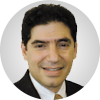By now, the profession has heard of the loss of Joe Keating. As with any good friend, Joe's death leaves a hole in our hearts that shall never be filled. To honor him, I will share the ethical lessons Joe taught me.
When I heard that Joe died, I went to visit a friend of mine in the counseling department at the University of Bridgeport.
To me, it was incomprehensible for me to be in the Phoenix area and not make the time. I was grateful that he came to pick me up, so I bought dinner. At dinner, I told him not only of how grateful I was that he picked me up, but also how important he had been to me in my life. He helped guide my learning of critical-thinking and research methods. He had been a friend, advisor, resource and confidant. I didn't know it would be the last time I'd see Joe; fortunately, I did talk to him a couple of weeks before he died.
After his death, I received e-mails from many of our mutual friends, for whom his death reminded them of their own mortality and motivated them to make sure they said thank you to those who mattered in their lives. I contemplated making such a public thank you in this column to those who, likewise, deserve an expression of gratitude from me. However, I decided that it wasn't appropriate and will e-mail them separately. You know who you are - thank you!
Nevertheless, gratitude is a duty we owe to all those from whom we have benefited in any way. Even if someone expects gratitude or doesn't show reciprocation, we need to show appreciation - as Joe always did. The late Fred Lebow used to say that one would be amazed at what a T-shirt would get volunteers to do. The T-shirts were just a way of saying thank you before the fact. Napoleon knew this - that is why he developed campaign medals and ribbons for the chests of those who had served in a military campaign with him. He wrote, "A soldier will fight long and hard for a bit of colored ribbon." The ribbons were another way to say thank you.
The second lesson in ethics Joe taught me was having the courage of your convictions. Joe was brutally honest but never mean-spirited. I know that made many people in the profession dislike him. Even people who appreciated Joe often confided that his relentless pursuit of ridding chiropractic of what he called "gobbledygook" wore thin on them. Nevertheless, Joe was relentless because he had the courage of his convictions, in spite of how it might tarnish his reputation. Ignoring the gobbledygook would have been unethical to Joe. I know he loved the title of Dr. Keith Charlton's paper, "Silence Is Not Golden: It's Consent."1
I remember Joe's monthly e-mails promising a dinner to anyone who could show him a chiropractic journal issue devoid of gobbledygook. Every so often, after some event that highlighted the gobbledygook in the profession, Joe would send out an e-mail to a bunch of docs around the world and start a debate on the point. I'll miss those e-mails, but I'm sure some will not. His opinion in those debates probably became another reason for some people to dislike Joe. But that was OK because Joe had the courage of his convictions and sometimes even reveled in the negative response. I've written before that the profession's best friend is a good critic. Joe was the person who inspired that.2
I guess one could say I learned well the lesson of having the courage of your convictions. I've found over the five years of writing for DC that they have provoked antagonism from both sides of the fence. I've been attacked for what I have written and attacked for what I haven't written. By this, I mean people have attacked me because I've taken a position on some ethical issue and then others have attacked me because I have not yet taken a position on their pet issue. Nevertheless, like Joe, I'll continue to have the courage of my convictions; he would have wanted it that way.
References
- Charlton KH. Guest editorial. Silence is not golden: it's consent. Chiropr J Aust, 2003;33(3):81-2.
- Perle S. Professional Courtesy. Dynamic Chiropractic, 2004;22(17).
Click here for previous articles by Stephen M. Perle, DC, MS.





